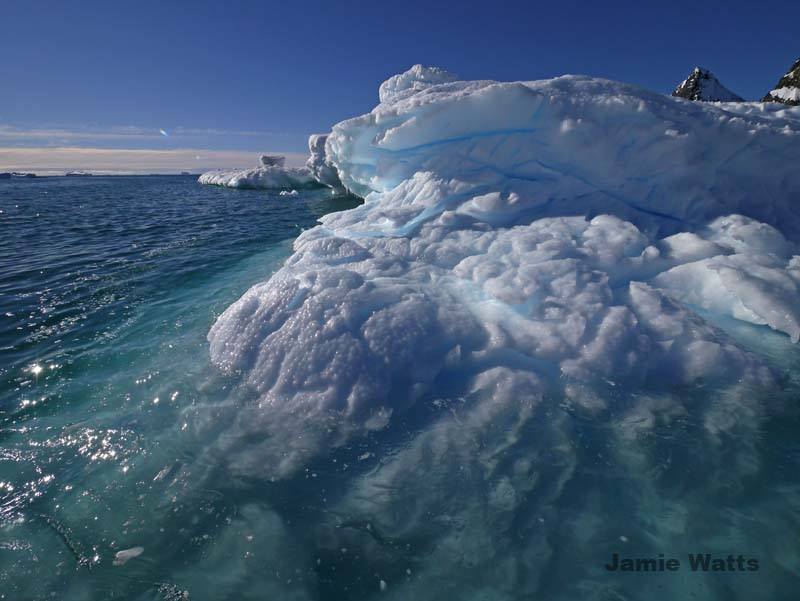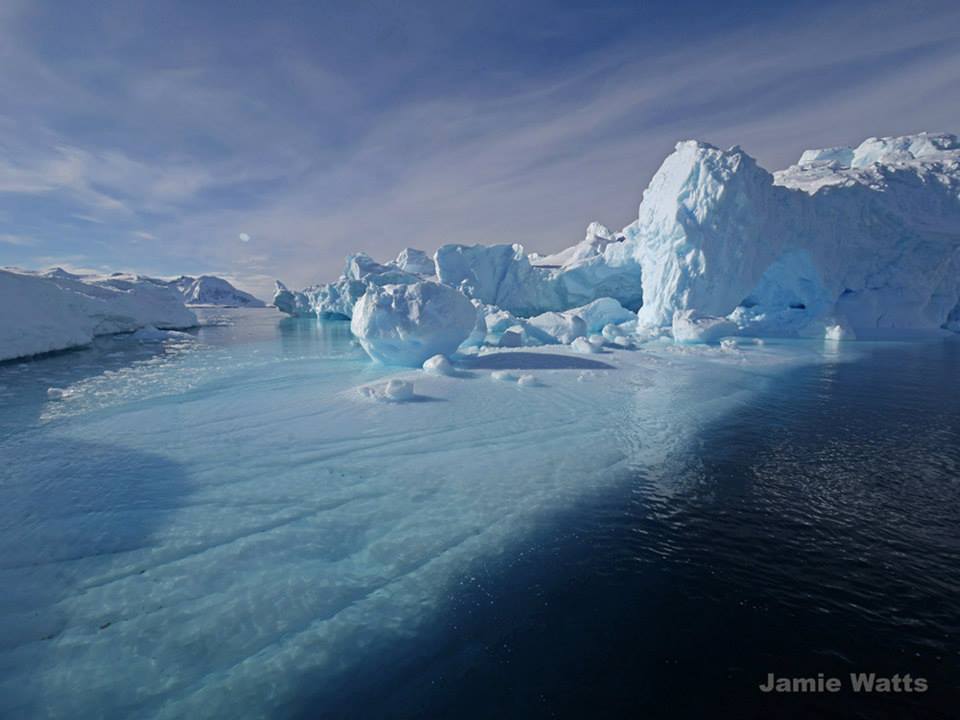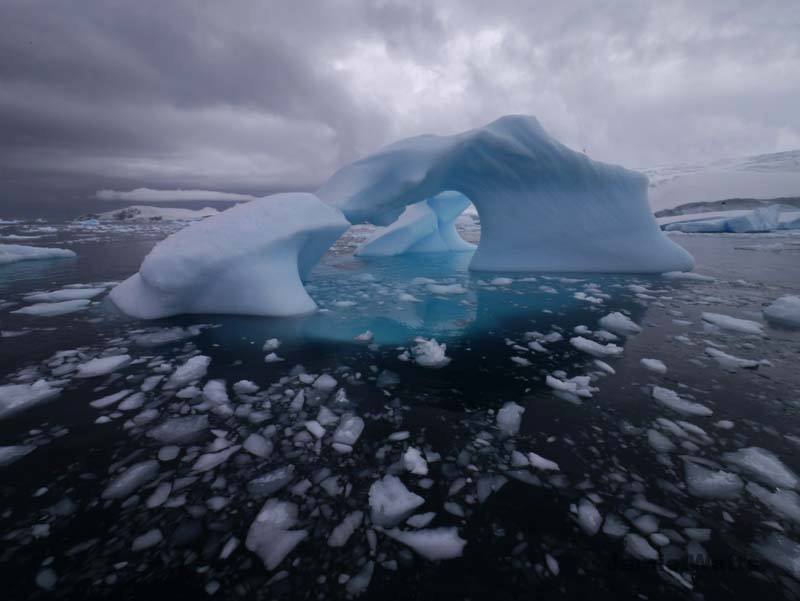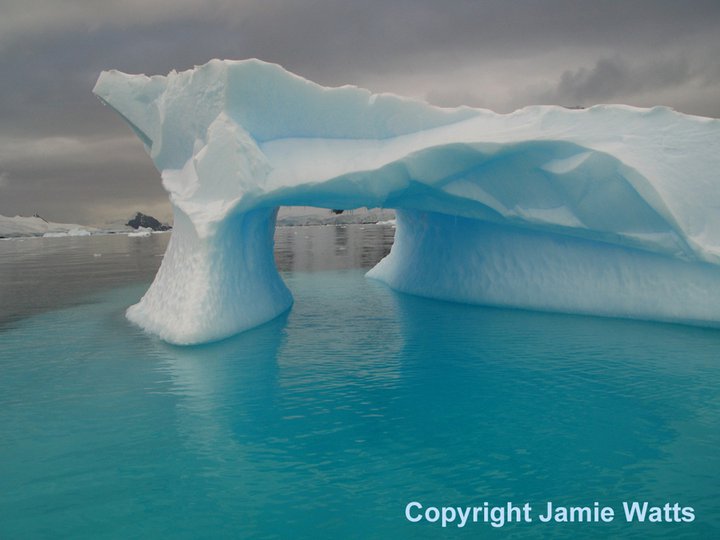News
Whales in the Antarctic
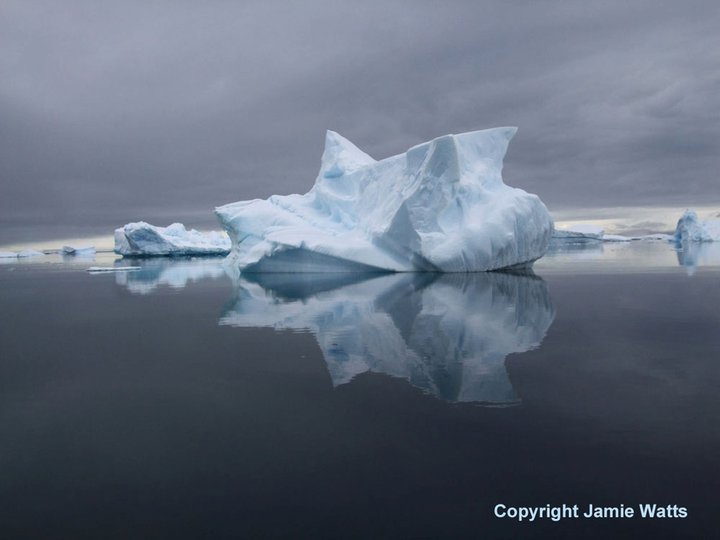
I’ve been coming down to the Antarctic Peninsula nine long summers now, and every year the humpbacks become more conspicuous, more numerous and more interactive. It’s a wonderful thing. Seven per cent population growth a year, researchers are estimating – as fast as they can possibly reproduce. Seven per cent is a magic number – it means doubling in a decade. By somewhere around the mid 2030s they should reach their pre-whaling levels.
We see minkes, mostly in amongst the loose brash, and we often see fin whales, generally out in the Drake or the open Scotia Sea. Very, very rarely we’ll see one of the giant blues; the Antarctic blue, the biggest subspecies of the biggest animal that ever lived – also the subspecies hit hardest by the whalers. But even with them there are positive signs; this year nine blues were seen together off South Georgia.
But the humpbacks – they move where we tourist ships move, outside the thickest ice but in amongst the islands. They don’t slice past us at speed like the others, but linger, stick around, even show curiosity for our Zodiacs and their inhabitants. They are the most playful, the most agile and athletic whale, the greatest migrator and the ones we know and love best.
Cierva Cove is close to where the Antarctic continent was first landed, 195 years ago. A stunning bay, boxed in somewhat by a couple of islands, with a magnificent glacier tumbling down into it from the spine of the Antarctic Peninsula beyond. It catches quite a few of the icebergs passing north from the Gerlache strait, and the back of the bay is impenetrable to our zodiacs much of the time with thick brash and massive bergs. It also catches nice pockets of krill, and this is why on this particular late February morning dozens of humpback whales were working the bay.
We started spotted them way out from our drifting position as soon as we had light – threes and fours, lunging at the surface. Further in we passed several groups close to the ship, and as we slowed down to lower Zodiacs they even started to approach more closely. They weren’t even slightly interested in the ship, I think, they were just working their way through the krill and it happened to bring them in our direction.
First whale up close and personal from the Zodiac was a youngster, perhaps eight or nine metres long and about ten tonnes. It’s a young population and many of these animals are just a few years old. He was energetic, multiple lunges near our little boat, and curious – he spy-hopped us. But he was also somewhat inefficient in his foraging. The faster, sleeker whales work alone and do fast lunges, but that’s not what works best for humpbacks. He was doing short, fast gulps, not opening his throat widely, but more importantly he wasn’t doing anything to herd the krill. Maybe a phone-booth’s volume of water each gulp, but probably only a kilo or so of krill with each mouthful.
The Antarctic krill is earth’s greatest protein and oil source, attracting the largest gatherings of marine mammals and birds on earth. But the average density even here is pretty low – to feed effectively you not only need to find the densest patches of krill but you need to gather them efficiently. Before whaling, the great whales had become ecologically a force to be reckoned with – the greatest consumers of food of any mammal group on the planet (unprecedented for carnivores) until the rise of humans. They were masters of the densest ocean food web of all, due to their stupendous foraging arsenal.
The next humpbacks were a bit more onto it. Three whales working together, they were working spirals, and at least one of them was bubble-netting. Humpback arms are the biggest limbs on earth – over five metres long in large animals. They look odd and lumpy, but it turns out the knobbles and patches of barnacles break up water turbulence, and these long wing-like arms are superbly efficient hydrofoils. Not only do they provide lift – these animals literally fly through the water on the longest migrations of any whale – but they can also bend and twist to give humpbacks incredible high-speed twists and turns that no other whale can perform.
Combined with their rather muscular build and a level of hunting coordination that has never been seen in other whales, this makes for an impressive krill-gathering ability. The larger of these three whales was bubble-netting; swimming below and around the edge of the krill swarm letting out a curtain of bubbles, which herds the krill towards the middle in a tight cluster. The other whales swam around the edge, waving their tails inwards. Then one at a time they would lunge in towards the middle of the prey cluster, taking a large gulp.
Another group appeared, closing in and before long was working alongside this trio – the two groups even looked to be helping each other out – packing their two krill patches tight right up against each other. The new trio included two larger animals – thirteen metres or more and perhaps thirty tonnes apiece, and both were bubble-netting. I have seen dozens of bubble-nets and they always spiral inwards to the right. Humpback whales, like Derek Zoolander, are not ambi-turners, apparently.
A couple of times the bubbles started to surface just ahead or just to the side of the Zodiac. I wasn’t concerned – I have never known a whale to be anything other than superbly aware, sensitive to and more than able to avoid boats or swimmers.
It seems that the humpbacks improve the art and technique of bubble-netting as they mature. It requires coordination and communication, as well as rather an impressive use of the ever-tightening turns afforded by those huge arms. We have no idea how they coordinate, or indeed how they are aware of or find the krill in the water, but the concentrations of krill they absolutely depend on – kilogrammes per cubic metre – are rather high. The two larger whales of the joining trio did a classic, elegant double spiral of bubble nets. The first whale started a ring about fifteen metres across, then fifteen seconds later a second set began to appear across the other side, both spiralling in together in a beautiful fractal symmetry. A pause and then a lunge – all three whales at 45 degrees upwards through the middle of the concentrated krill patch.
The sheer physics of the lunge itself is pretty impressive. Off Alaska where the humpbacks hunt faster-moving prey the lunges are fast, vertical and vast. Down here, the krill-eaters are somewhat more sedate, but still impressive. The smaller, younger animals seem to have less distendable throats and do shorter, almost horizontal surface lunges, sometimes flopping over on one side. I even saw a young whale last year porpoising over the top and opening its mouth as it came down on top of the krill patch.
The bigger, older whales seem to mature their abilities and perhaps become more physically flexible in the throat. They lunge straight upwards after a tight turn at the end of the bubble-net. They accelerate then snap their mouths open wide – up to about right angles – at the last couple of seconds just before they hit the surface. The articulation of the jaw opens out on elastic tendons, and the front joint of the jaw is similarly flexible so that the arch of the jaw opens outwards to widen the scoop. The forces are enormous. The grooved throat balloons out to about the size of a small garage to take in up to twenty tonnes of water in a large adult, the sofa-sized tongue turned inside out by the force of the sudden opening of the parachute-like gape. The mouth then snaps shut, sealing quickly at the front of the lips, squeezing out tonne after tonne of water through the filter of the baleen plates hanging from the sides of the top lip as it zips shut from the tip of the snout backwards on either side. Then the throat squeezes, water gushing back through the baleen and out of the downturned corners of the mouth over the eyes. The sides of the jaw and the muscular throat, deformed by the pressure of the lunge, slowly pull back into place.
An Antarctic humpback might gather tens of kilos with each gulp, and after a good morning of feeding have a tonne of krill in their stomach. Only the fin and blue whales, with their even larger gapes and faster open-water lunges can gather more. The humpbacks gorge themselves, defecating as they are feeding to make space to squeeze in more krill, the big ones gaining ten to fifteen tonnes in a season. The largest get to fifty tonnes or more, as big as the largest dinosaurs. The faeces seeds the ocean with iron – and until 75 years ago gave the Southern Ocean an iron boost that fertilized the seas and drove up plankton productivity as well as natural carbon sequestration. And they’re coming back.
In every direction, groups of three to four whales moved around, sometimes coming together as clusters, sometimes spy-hopping close to our boats. We left them for a while to play in the brash and look at some icebergs and a dozing leopard seal, but on the way back to the ship came across more groups. We had to get back, the ship had to leave, to head north towards Elephant Island then South Georgia.
Oh all right, then, one more group of whales….
Visit Jamie’s website for all his latest news and blogs: www.jamiewatts.co.uk
Jamie’s blog was provided by Oonasdivers.
News
Santa Divers take the Plunge for Charity

Ho Ho Ho! Vobster Quay’s recording-breaking charity Santa diving event returns on Sunday 15th December 2024 for another round of festive fundraising frivolities. Run in aid of the Royal National Lifeboat Institution (RNLI) and Help For Heroes, this ever-popular annual fundraising event aims to raise sack-loads of cash for these two very deserving charities.
Divers of all levels are invited to grab their Santa outfits – and as much festive cheer as they can muster – and head down to Vobster Quay near Mells, Somerset for a mass sponsored Santa dive in aid of charity. In previous years, the event has attracted divers from the far corners of the UK to join in the festive merriment for a final festive dive before the Christmas and New Year break. Back in 2015, the event smashed the world record for the most Santa divers with 188 divers taking to the waters donning their festive finery – a record that remains unbeaten to this day!

Vobster Santas isn’t just about setting records – it’s also about raising some serious cash for charity. Vobster Quay encourages all divers to get into the spirit of the season to raise much-needed funds for two very deserving charities – the Royal National Lifeboat Institution (RNLI) and Help For Heroes.
Through individual sponsorship and online donations, divers can invite their friends, family and work colleagues to sponsor them to plunge into the balmy waters of Vobster Quay dressed in full festive finery. Since the very first Santa dive in 2007, the event has raised over £52,000 for charity. “It’s been over 17 years since the very first charity Santa dive took place at Vobster Quay and every year the event just keeps getting bigger and better” enthused Vobster Quay owner, Amy Stanton.
“Vobster Santas is a great way for divers to say a massive thank you to the both the RNLI and Help For Heroes – two very deserving charities close to our hearts. We’re immensely proud of all that Vobster Santas has achieved and hope that even more divers will join this year’s event on Sunday 15th December. I’m confident that we can make Vobster Santas 2024 the biggest yet!”.
Divers wishing to participate can get involved by simply registering their attendance at
www.vobster.com/event-vobstersantas.php.

Blogs
Dive into Adventure at Hideaway Beach Resort & Spa: The Ultimate Diving Destination in the Maldives

Tucked away in the remote northern Haa Alifu Atoll, Hideaway Beach Resort & Spa is a premier destination for anyone seeking an unforgettable underwater experience. With over 30 dive sites to explore, divers of all levels can witness the unique and mesmerising beauty of the underwater world. Whether you’re a seasoned diver or new to the sport, Hideaway offers an exceptional diving adventure that is not to be missed.

Explore the Beauty Beneath the Surface
Hideaway is perfectly situated near some of the most spectacular dive sites in the Maldives. The dive school and team at Hideaway offer a very personalised experience to ensure each diver gets an interactive, immersive experience.

Email: reservations@hideawaybeachmaldives.com / Call: +960 650-1515 / Website: www.hideawaybeachmaldives.com
Unique dive spots such as Theefaridhoo Thila (Heaven and Hell) as one of the 50 best dive sites in the whole of the Maldives, known for its beautiful soft coral gardens.

Email: reservations@hideawaybeachmaldives.com / Call: +960 650-1515 / Website: www.hideawaybeachmaldives.com
As the resort is located next to a channel which gives guests surprise visits from eagle rays, manta rays, guitar sharks and more.

Email: reservations@hideawaybeachmaldives.com / Call: +960 650-1515 / Website: www.hideawaybeachmaldives.com
One of the standout features of diving in the Haa Alifu Atoll is the abundance of rare and exotic marine species. The area is known for sightings of whale sharks, manta rays, turtles, and a variety of colorful reef fish. Diving at Hideaway Beach Resort & Spa offers a rare opportunity to encounter these creatures in their natural habitat, creating lifelong memories for guests.

Email: reservations@hideawaybeachmaldives.com / Call: +960 650-1515 / Website: www.hideawaybeachmaldives.com
Whether you’re exploring deep coral gardens, dramatic overhangs, or vibrant reef walls, each dive offers something new and exciting. The visibility in the Maldives is exceptional, often exceeding 30 meters, making it ideal for both underwater photography and general exploration.

Email: reservations@hideawaybeachmaldives.com / Call: +960 650-1515 / Website: www.hideawaybeachmaldives.com
Diving for All Levels
At Hideaway, we believe that everyone should have the opportunity to experience the thrill of diving. That’s why we cater to divers of all levels, from beginners to experienced professionals. Our professional dive center, led by expert instructors, offers a range of courses and guided dives. If you’re new to diving, you can start with an introductory course that will teach you the basics of scuba diving in a safe and controlled environment.

Email: reservations@hideawaybeachmaldives.com / Call: +960 650-1515 / Website: www.hideawaybeachmaldives.com
For more experienced divers, we offer advanced dive courses and guided excursions to some of the more challenging dive sites. Our instructors are knowledgeable and passionate about the local marine life, ensuring that every dive is not only safe but also informative and enjoyable.

Email: reservations@hideawaybeachmaldives.com / Call: +960 650-1515 / Website: www.hideawaybeachmaldives.com
Exclusive Diving Offer
To make your stay even more unforgettable, Hideaway is offering an exclusive diving package designed to enhance your experience both above and below the water. When you book a minimum 7-night stay, you’ll receive:
- 35% discount on room rates.
- Complimentary diving: 3 dives per person for 2 guests, allowing you to experience the beauty of the Maldives underwater world.
- Free meal plan upgrade: enjoy a complimentary upgrade from Bed & Breakfast to Half Board, or from Half Board to Full Board. Guests who prefer the White Platinum Plan (WPP) can avail it at a discounted rate.
This incredible offer provides the perfect opportunity to experience world-class diving while enjoying all the luxury and comfort that Hideaway Beach Resort & Spa is known for.

Email: reservations@hideawaybeachmaldives.com / Call: +960 650-1515 / Website: www.hideawaybeachmaldives.com
Combinable Offers for Even More Value
This diving offer can also be combined with our Anniversary and Honeymoon offers, allowing you to create the perfect celebration package. Whether you’re celebrating a milestone or simply seeking a romantic getaway, this offer ensures that you can enjoy the best of both worlds – luxurious accommodations and unforgettable diving adventures.

Email: reservations@hideawaybeachmaldives.com / Call: +960 650-1515 / Website: www.hideawaybeachmaldives.com
Terms & Conditions
- This offer is available exclusively for bookings made through the official Hideaway Beach Resort & Spa website using a specific booking code.
- The offer cannot be combined with other promotions available on the website or through other channels, nor can it be redeemed for cash.
- All dives are subject to weather conditions, ensuring the safety and enjoyment of all guests.
- Black-out dates: This offer is not available from 24th December 2024 to 9th January 2025.
To book this exquisite offer, use the Promo Code: SCUBA24FD

Email: reservations@hideawaybeachmaldives.com / Call: +960 650-1515 / Website: www.hideawaybeachmaldives.com
Hideaway is not just a resort; it’s a sanctuary for those seeking peace, adventure, and luxury. With spacious villas, private pools, and world-class dining options, the resort offers everything you need for a perfect holiday. From tennis, golf, gym, cycling to the exquisite underwater activities, unique dining options, Hideaway has something for everyone. And for diving enthusiasts, it provides an unparalleled opportunity to explore some of the most beautiful dive sites in the world.

Email: reservations@hideawaybeachmaldives.com / Call: +960 650-1515 / Website: www.hideawaybeachmaldives.com
Our dive center is fully equipped with state-of-the-art gear, ensuring that every dive is safe, comfortable, and enjoyable. Our instructors are passionate about the underwater world and are eager to share their knowledge with you, whether it’s your first dive or your 100th.

Email: reservations@hideawaybeachmaldives.com / Call: +960 650-1515 / Website: www.hideawaybeachmaldives.com
The Ultimate Dive Adventure Awaits
If you’re looking for an unforgettable diving holiday in the Maldives, look no further than Hideaway Beach Resort & Spa. With over 30 dive sites, unique marine life, and exclusive offers, we provide the ultimate underwater experience. Whether you’re celebrating a special occasion or simply seeking adventure, our diving package offers exceptional value and incredible memories.

Book now through our official website to take advantage of this exclusive offer and prepare for the dive adventure of a lifetime.
Email: reservations@hideawaybeachmaldives.com
Call: +960 650-1515
Website: www.hideawaybeachmaldives.com

-

 News1 month ago
News1 month agoIconic SS United States to become the World’s Largest Artificial Reef
-

 Blogs3 months ago
Blogs3 months agoNovoScuba’s Game-Changing Approach for Dive Store Owners: WE PAY YOU!
-

 News2 months ago
News2 months agoBook Review – 52 Assignments: Underwater Photography
-

 Gear News2 months ago
Gear News2 months agoDYNAMICNORD – New German diving brand enters the British market
-

 News2 months ago
News2 months agoExploring Cenote El Pit: A Diver’s Dream
-

 Gear News2 months ago
Gear News2 months agoTry BARE drysuits (and maybe even win one!) this Friday with Sea & Sea at North West Dive Fest
-

 News3 months ago
News3 months agoComing Soon – 52 Assignments
-

 News3 months ago
News3 months agoSave £200 per person per week at Pole Pole Lodge with Dive Worldwide


